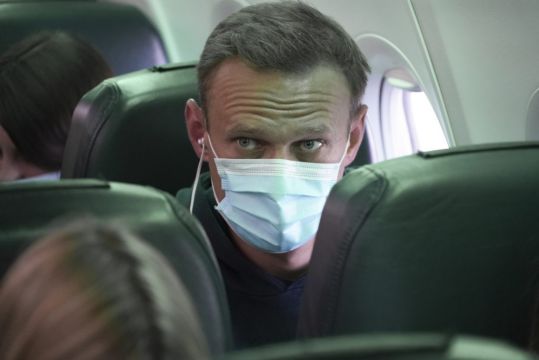Several allies and supporters of Russian opposition leader Alexei Navalny have been detained in Moscow after protests last weekend demanding his release from prison drew tens of thousands to the streets in more than 100 Russian cities.
Mr Navalny’s top ally Lyubov Sobol, Anastasia Vasilyeva from the Alliance of Doctors union, and Maria Alyokhina from the Pussy Riot punk collective have been detained for 48 hours along with Mr Navalny’s brother Oleg.
All four are reported to be suspects in a criminal investigation into alleged violations of coronavirus regulations during the mass rally in Moscow.
The raids came four days before new protests Mr Navalny’s supporters have called for Sunday.

Mr Navalny, 44, the most well-known critic of President Vladimir Putin’s government, was arrested on January 17 on his return from Germany, where he spent five months recovering from nerve-agent poisoning that he blames on the Kremlin. Russian authorities have rejected the accusations.
The overnight detentions of his supporters came after more than a dozen raids on apartments and offices of his family, associates and supporters, including Mr Navalny’s flat, where police detained his brother, and a rented apartment where his wife Yulia has been living.
Also on Thursday, Russia’s Investigative Committee said it had opened a criminal probe against Mr Navalny’s top strategist Leonid Volkov, accusing him of encouraging minors to participate in unauthorised rallies.
In a further challenge to Mr Putin, two days after Mr Navalny’s arrest, his organisation released an extensive video report on a palatial seaside compound allegedly built for the president. It has been viewed more than 98 million times, further stoking discontent.

Demonstrations calling for Mr Navalny’s release took place in more than 100 cities across the nation on Saturday, a strong show of rising anger toward the Kremlin. Nearly 4,000 people were reported arrested.
Mr Navalny fell into a coma while aboard a domestic flight from Siberia to Moscow on August 20. He was transferred from Siberia to a Berlin hospital two days later.
Labs in Germany, France and Sweden, and tests by the Organisation for the Prohibition of Chemical Weapons, established that he was exposed to the Soviet-era Novichok nerve agent.
Russian authorities have refused to open a full criminal inquiry, citing a lack of evidence that Mr Navalny was poisoned.
His arrest and the harsh police actions at the protests have brought widespread criticism from the West and calls for his release.







